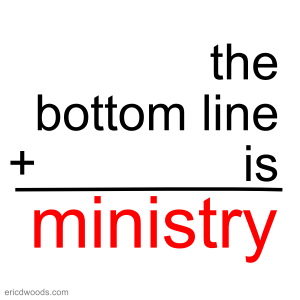2 Corinthians 5:18-21
18 All this is from God, who reconciled us to himself through Christ and gave us the ministry of reconciliation: 19 that God was reconciling the world to himself in Christ, not counting people’s sins against them. And he has committed to us the message of reconciliation. 20 We are therefore Christ’s ambassadors, as though God were making his appeal through us. We implore you on Christ’s behalf: Be reconciled to God. 21 God made him who had no sin to be sin for us, so that in him we might become the righteousness of God.
 As the retreats director, I spend a lot of time developing, tracking and managing budgets. We invest significant time deconstructing last year’s budget before we create next year’s budget. We do daily checks, weekly reporting, and seasonal analysis. We want to know what happened, and why.
As the retreats director, I spend a lot of time developing, tracking and managing budgets. We invest significant time deconstructing last year’s budget before we create next year’s budget. We do daily checks, weekly reporting, and seasonal analysis. We want to know what happened, and why.
Why did we go over in this area? What has kept us from spending the necessary funds in another?
We try to understand whether our budget misses (positive or negative) were the result bad budgeting, mismanagement, or some surprise.
But all these things—all these checks and balances—really aren’t about money. For me, the bottom line is ministry.
Careful management of our resources, including money and both tangible and human resources, is about helping us to most faithfully fulfill God’s call on our lives for ministry. It pays off in these three areas:
1. Integrity.
Our budget is a commitment to our leadership, board of directors, and constituents to do certain things within certain parameters. A good budgeting process results in a good plan that can be executed without compromise, and adjusted as circumstances and conditions change. When we miss significantly, we have to answer for it. When we exceed expectations—though more fun than the latter—we also explain why we misjudged the potential outcomes.
2. Stewardship.
Over the history of SpringHill Camps, many generations of staff have seen God’s provision—and we see it today. We know that the resources we have are all gifts from Him, and it is our responsibility to care for them, and manage and use them wisely. Our budget provides a framework for the good stewardship of those resources, and demonstrates to our campers and our donors that we honor their contribution.
3. Ministry.
Designing a budget isn’t about keeping our costs as low as possible or our margins as high as possible. Ultimately, it’s about maximizing our ministry effectiveness. We weigh every line of expenses against how it will help us to accomplish our mission, of creating life-impacting experiences that enable young people to know and to grow in their relationship with Jesus Christ.
What’s driving your bottom line?
Your closing statements are spot on. Nicely written.
Thanks, Joe!